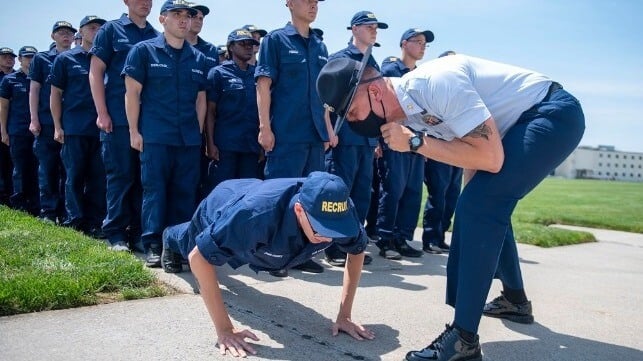The United States Coast Guard is a unique branch of the military that performs an array of vital functions, safeguarding our nation’s maritime interests, ensuring marine safety, and actively participating in search and rescue operations.
But to sustain these responsibilities and more, the Coast Guard relies on recruiting dedicated and passionate individuals to its ranks.
Here, we delve deep into the various recruitment programs that facilitate this.
A Comprehensive Overview of Coast Guard Recruitment Initiatives
The United States Coast Guard constantly evolves its recruitment strategies, ensuring that they attract the brightest and most dedicated candidates. Let’s explore the most prominent of these programs.
1. Direct Entry Education Program
For those with advanced educational qualifications, this program offers a direct path into officer roles. This is especially beneficial for individuals who have degrees in fields like engineering, law, environmental management, and more. The Coast Guard values specialized knowledge and ensures that those with the requisite academic backgrounds can quickly integrate and contribute.
2. Boot Camp and Basic Training
Every recruit, regardless of their eventual role, begins their journey with Basic Training at the Coast Guard Training Center in Cape May, New Jersey. This intensive 8-week program familiarizes candidates with the rigors of military life, imparts essential survival skills, and instills a sense of discipline and camaraderie.
3. The Coast Guard Academy
Offering a rigorous 4-year program, the Coast Guard Academy in New London, Connecticut, produces future leaders. Graduates earn a Bachelor of Science degree and are commissioned as Ensigns in the Coast Guard. The Academy provides a balance of challenging academics, physical fitness training, and leadership development.
4. The College Student Pre-Commissioning Initiative (CSPI)
This scholarship program targets students currently enrolled in college who demonstrate significant leadership potential. Successful CSPI candidates will complete two years of college, attend Officer Candidate School, and then serve as Coast Guard officers upon graduation.
5. Aviation Opportunities
For those with a passion for flying, the Coast Guard presents various avenues to become an aviator. From piloting the MH-60T Jayhawk helicopter to the HC-144 Ocean Sentry aircraft, there are numerous roles available for those who dream of soaring the skies while serving their country.
6. Reserve Opportunities
The United States Coast Guard Reserve is a flexible way to serve. As a reservist, one can maintain a civilian career while dedicating a few weekends a month and two weeks a year to training and service. The Reserve ensures that, during times of national need, the Coast Guard can call upon a trained and ready force.
7. Auxiliary and Volunteer Opportunities
The Coast Guard Auxiliary is a civilian volunteer component that supports the Coast Guard in nearly all of its service missions. Becoming an Auxiliary member is a fulfilling way to serve your community and country without the full-time commitment of active duty.
Benefits of Joining the Coast Guard
Enlisting in the United States Coast Guard isn’t just about service; it comes with numerous personal and professional benefits.
- Education: The Coast Guard offers numerous educational benefits, including tuition assistance, scholarships, and the GI Bill.
- Healthcare and Retirement: Active duty and reserve members receive comprehensive medical and dental care. Additionally, the Coast Guard provides a competitive retirement plan.
- Personal Development: Beyond the tangible benefits, service in the Coast Guard fosters personal growth, discipline, leadership skills, and a lifelong bond with fellow service members.
Overview of United States Coast Guard Recruitment Programs:
To maintain its standard of excellence, the USCG offers various recruitment programs tailored to meet diverse career aspirations and personal growth. Here, we’ll provide an overview of the prominent recruitment pathways.
Basic Training and Requirements:
Every potential Coast Guardsman, regardless of their desired profession or specialization, must undergo basic training. This rigorous program equips recruits with the foundational skills necessary to thrive in the USCG. The core requirements for basic training include:
- Age: Typically, applicants need to be between the ages of 17 and 31.
- Citizenship: Only U.S. citizens or permanent residents are eligible.
- Education: A high school diploma or GED is essential, though some programs may demand higher educational qualifications.
- Physical Fitness: Aspirants must pass the Physical Fitness Test which evaluates endurance, strength, and agility.
Specialized Programs and Opportunities:
The Coast Guard isn’t just about basic training. There are multiple specialized programs for those seeking specific roles or advanced training.
- Direct Commission Programs: This program is ideal for professionals who already possess specific skills or qualifications. Applicants can directly become officers in their respective fields. This might include areas like engineering, law, or environmental management.
- College Student Pre-Commissioning Initiative (CSPI): CSPI targets high-achieving, low to moderate-income college students who demonstrate leadership potential. Participants undergo training during college and, upon graduation, are commissioned as officers in the Coast Guard.
- Officer Candidate School (OCS): OCS is a challenging, 17-week program designed to transform civilians or enlisted members of any branch of the military into Coast Guard officers. Graduates from OCS then serve in leadership roles across various USCG missions.
- Enlisted Training Opportunities: For those looking to develop specialized skills within the enlisted ranks, there’s a wealth of advanced training options. This could range from technical training in areas like electronics or mechanics to more specialized roles like aviation or public affairs.
However, the United States Coast Guard offers an array of recruitment programs tailored to individuals from different backgrounds and with varied aspirations. Whether you’re a high school graduate, a college student, or a seasoned professional, there’s a pathway in the USCG that can lead to a rewarding and fulfilling career in maritime service. Joining the Coast Guard isn’t just about serving the nation—it’s also about personal growth, acquiring specialized skills, and being part of a proud legacy.
How to Apply for United States Coast Guard Recruitment:
If you’re considering joining the USCG, here’s a straightforward guide to help you navigate the recruitment process.
1. Basic Eligibility Criteria:
Before diving into the application process, ensure you meet the basic eligibility requirements. Typically, this involves:
- Being a U.S. citizen or a resident alien.
- Meeting age requirements (usually between 17-31, but there are exceptions based on roles and prior service).
- Having a high school diploma or GED equivalent (some roles may require higher educational qualifications).
- Possessing a clean criminal record.
- Meeting the Coast Guard’s moral, physical, and medical standards.
2. Application Process Steps:
a. Contact a Recruiter: Begin your journey by reaching out to a local Coast Guard recruiter. They’ll provide insights into life in the USCG, clarify any doubts, and guide you through the subsequent steps of the application process.
b. Gather Necessary Documents: Ensure you have essential documents on hand, including your birth certificate, Social Security card, educational transcripts, and any other pertinent records. This helps in verifying your identity, citizenship, and qualifications.
c. Undergo Medical and Fitness Evaluations: Your health and physical capabilities will be assessed to ensure you’re fit for service. This typically includes a thorough medical examination and a physical fitness test which evaluates your strength, stamina, and endurance.
d. Attend a Military Entrance Processing Station (MEPS): At MEPS, you’ll undergo further evaluations and interviews. This step ensures all prospective recruits meet the military’s standards. It’s also where you’ll take the Armed Services Vocational Aptitude Battery (ASVAB) test, which determines your qualification for specific Coast Guard jobs.
e. Enlistment or Commissioning Ceremony: Once you’ve cleared all the aforementioned steps and been accepted into the USCG, you’ll partake in an enlistment or commissioning ceremony. This significant event marks your formal entry into the United States Coast Guard, committing you to serve and protect the nation’s maritime interests.
However, the USCG recruitment process is a structured journey to ensure that only the best and most qualified candidates serve. By understanding the steps and preparing accordingly, you’ll be better positioned to join the ranks of this prestigious maritime force.
Tips for a Successful United States Coast Guard Application:
Navigating the application process for the United States Coast Guard (USCG) can be a daunting task. But with the right preparation and resources, you can enhance your chances of success. Here’s a concise guide to help you with your USCG application:
Preparing for Physical Training:
- Stay Active: Start incorporating cardiovascular exercises, strength training, and flexibility routines into your daily life. Activities like running, swimming, push-ups, and sit-ups are particularly beneficial as they align with the USCG’s fitness standards.
- Follow the USCG’s Fitness Guidelines: The USCG has specific physical fitness requirements. Familiarize yourself with these and set tangible goals to meet or exceed them.
Researching USCG Roles and Missions to Identify the Best Fit:
- Understand the Scope: The USCG has a wide range of roles, from maritime law enforcement to environmental protection. Review each role thoroughly to understand where your skills and interests might align.
- Ask Questions: If you’re uncertain about any roles, reach out to recruitment officers or current members for clarity. They can provide insight into the day-to-day realities of each position.
Preparing for Interviews and Evaluations:
- Research Common Interview Questions: While you might face role-specific questions, many interview queries focus on leadership, teamwork, and problem-solving. Prepare answers for these in advance.
- Practice Makes Perfect: Consider mock interviews or role-playing with a friend or mentor. This will help you gain confidence and refine your answers.
Utilizing Resources:
- USCG’s Official Website: This is your go-to source for official information. The website provides detailed guides, application forms, and an overview of the USCG’s missions and roles.
- Network with Current Members: Connecting with those already serving in the USCG can be invaluable. They can offer firsthand experiences, answer queries, and give you a glimpse into the life of a Coast Guard member.
By following these tips and dedicating time to preparation, you can navigate the United States Coast Guard application process with greater ease and confidence. Remember, success in any application is often a blend of preparation, passion, and perseverance.
Conclusion:
The United States Coast Guard (USCG) stands as a pillar of national security and maritime safety. Its essential role is evident in ensuring secure coastlines and safeguarding the nation’s maritime interests.
Moreover, being a part of the USCG isn’t just about serving the nation; it’s about embracing a fulfilling career filled with vast opportunities.
For those looking to make a difference while unlocking a myriad of professional avenues, the USCG is a remarkable choice. In essence, the USCG not only assures the safety of our waters but also promises a rewarding future for its members.



